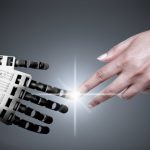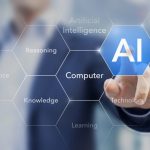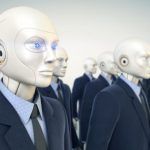AI and Humans: Focusing on what we can achieve together

Dystopian fever spiked again last week as PwC issued a report predicting UK jobs carnage at the hands of robots over the coming decade. "Artificial Intelligence" has dark overtones in the media and the popular imagination. Some of us are buzzed about this new era of augmented human performance and meaningful human computer interactions. Others worry for their livelihoods, even their personal freedoms.
AI technology has improved significantly over the last few years, mainly because of a combination of a huge increase in the availability of data and cheap computation. This means that AI researchers now have meaningful amounts of "training data" to train their models and the computational power needed to run complex learning approaches. The sudden acceleration of AI performance is a thrilling development for data scientists, and great seed material for ominous sci-fi and gloomy consultancy forecasts.
AI will make and break the job market

There’s a heated debate going on whether artificial intelligence will cause people to lose jobs or create new jobs instead. Well, IT consultancy firm Infosys has weighed in on the debate, releasing the results of its own survey.
Basically, the firm says jobs will be both lost and created, so workers should not be too worried as long as they’re willing to re-train. However, companies will have reasons to rejoice as AI will boost their revenue, significantly.
How consumers are using AI and how they see its future

AI is starting to worm its way into our homes and workplaces, but a new study reveals that many consumers are currently unaware of the role it already plays in their lives.
The survey of almost 2,000 US consumers by predictive sales platform InsideSales.com shows that in both their personal and work lives, people are split in their use of AI. Outside the office, more than half (55 percent) report that they have used AI before, but only about 10 percent can be considered early adopters, using AI on a regular basis.
ARM introduces new architecture for artificial intelligence and machine learning

ARM, the Cambridge-based microprocessor company has just announced a new processor architecture that it promises will give a significant boost to artificial intelligence and machine learning technology.
The new technology, announced this Tuesday, is called DynamIQ and ARM describes it as "probably the biggest micro-architectural shift since ARM announced 64-bit ARMv8-A in 2011." This "monumental shift in multicore microarchitecture" is not the processor itself -- new Cortex-A processors will be built by ARM’s partners, both of which will be announced later this year.
Who's liable for decisions AI and robotics make?

Reuters news agency reported on February 2017 16 that "European lawmakers called [...] for EU-wide legislation to regulate the rise of robots, including an ethical framework for their development and deployment and the establishment of liability for the actions of robots including self-driving cars."
The question of determining "liability" for decision making achieved by robots or artificial intelligence is an interesting and important subject as the implementation of this technology increases in industry, and starts to more directly impact our day to day lives.
Ahead of the Galaxy S8 launch, Samsung officially announces its virtual assistant, Bixby

There have been so many leaks about Samsung's upcoming Galaxy S8 that, come launch day, there will be nothing new to learn. One of the features that slipped out a little earlier than planned was news of Samsung's own virtual assistant called Bixby. Now Samsung has officially unveiled its take on Siri and Cortana.
Drawing on artificial intelligence and deep learning, Samsung describes Bixby as "a new intelligent interface." But what makes Bixby any better, or different, than any other virtual assistant on the market? Samsung says that "completeness", "context awareness" and "cognitive tolerance" are the keys to its success.
Most businesses consider artificial intelligence essential to being competitive

A new report by Tata Consultancy Services has shown just how profound of an effect artificial intelligence already has, and will have, on businesses everywhere.
The "Getting Smarter by the Day: How AI is Elevating the Performance of Global Companies" study says 84 percent of companies worldwide see AI as "essential" to being competitive. Another half (50 percent) see the technology as "transformative."
How artificial intelligence will impact M&As and CLMs

Three months into 2017 and we continue to encounter stories and predictions about how artificial intelligence (AI) will fundamentally change a variety of industries on an almost day-to-day basis. While it’s receiving significant attention, the challenge is explaining what this type of technology could do to improve certain functions and jobs. Implementing systems to make dynamic and complex decisions as a way to displace humans is way off from mainstream adoption and the lack of articulating that concept effectively is typical of any hype cycle.
As we continue into the year, we will start to see the hype wear off and broader adoption of AI-based solutions within organizations, particularly in data analysis and deriving insight from that data. Let’s look at the trends we can expect over the coming months.
How AI can offer much-needed relief to UK's National Health Service

According to the Office for Budget Responsibility, the NHS budget will need to increase by £88billion over the next 50 years if it is to keep pace with the rising demand for healthcare in the UK. But with the 2017 Budget showcasing a massive leaning towards building up its Brexit reserves and allocating a mere £100 million for 100 onsite GP treatment centers in A&Es across England, the NHS is justifiably bracing itself for a painful future.
With £20billion worth of cuts scheduled by 2020, combined with fierce warnings that the UK’s health services are on the edge of an unprecedented crisis, the urgent call for solutions to be brought to the healthcare table has incontrovertibly intensified.
Microsoft and Nvidia unveil HGX-1 hyperscale GPU accelerator

Blueprints for a new hyperscale GPU accelerator have been introduced recently, jointly by Microsoft and NVIDIA. The two companies are saying the accelerator would "drive AI cloud computing."
The accelerator is called HGX-1 hyperscale GPU. It is released in conjunction with Microsoft’s Project Olympus, as an open-source design.
Embracing the possibilities of artificial intelligence

We have seen a machine master the complex game of Go, previously thought to be one of the most difficult challenge of artificial processing. We have witnessed vehicles operating autonomously, including a caravan of trucks crossing Europe with only a single operator to monitor systems. We have seen a proliferation of robotic counterparts and automated means for accomplishing a variety of tasks. All of this has given rise to a flurry of people claiming that the AI revolution is already upon us.
However, while there is no doubt that there have been significant advancements in the field of AI, what we have seen is only a start on the path to what could be considered full AI.
IBM and Salesforce partner to help businesses make smarter decisions

Although artificial intelligence has been around for some time, it's generally been beyond the reach of most businesses.
A new collaboration between industry giants IBM and Salesforce aims to put AI-enabled technologies into the hands of millions of users to help them make better informed decisions.
Training speech recognition to understand dialects

Dialects are an intrinsic part of who we are, and can represent home to many of us in a world becoming more global in nature. Many wonder though: how do we train speech recognition devices to understand such unique regional languages?
So what is a dialect? It’s a tricky question to answer that can get you into all sorts of political trouble in some areas of the world! In the past, central authorities were often skeptical of communities that claimed to have their own (regional) language, preferring rather to speak of a mere "dialect." In the reverse, smaller countries with a big neighbor often insisted they spoke its own language, not just a dialect of the neighbor's language. Luckily, linguistic variation today is often seen as a precious treasure of cultural heritage, but in many places linguist Max Weinreich’s summary that "a language is a dialect with an army and navy," is still valid. Avoiding those issues, I will use "dialect" in a pragmatic way, to encompass regional languages and accents.
Mark Zuckerberg's rambling letter covers fake news on Facebook, nudity and profanity -- and his ego

In a lengthy missive that has been described by some as a manifesto, Mark Zuckerberg has written a counterattack to criticism of his beloved Facebook. He waxes lyrical about a rosy vision of the future in which communities come together, everyone is included, and everyone is empowered -- largely facilitated by him. For a man who denies he has political leanings, he certainly seems to have been studying Speaking Like A Politician 101. He is nothing if not almost impressively vague.
But when Zuckerberg is not massaging his own ego as he dreams up ways to save the world ("I hope we can come together to build a global community that works for everyone"), the content of the website he created still gets a mention. In the age of Trump there is endless talk of fake news, and Facebook has certainly played a role in helping this to spread. This, along with other problems, such as the spread of terrorist propaganda, is something Zuckerberg wants to combat, and he's placing a great deal of confidence in artificial intelligence and his beloved algorithms.
Ford makes $1bn investment in Argo AI to research and develop self-driving car tech

One of the world’s largest car manufacturers, US-based company Ford, plans to invest $1 billion to research and build artificial intelligence for its vehicles.
Ford states that it will invest $1 billion in the Argo AI startup within the next five years, which will focus on building and developing self-driving car technology.
Recent Headlines
BetaNews, your source for breaking tech news, reviews, and in-depth reporting since 1998.
© 1998-2025 BetaNews, Inc. All Rights Reserved. About Us - Privacy Policy - Cookie Policy - Sitemap.